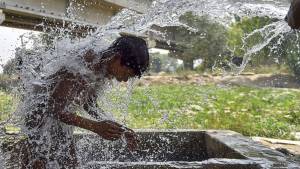
HEAT-WAVE GRIPS KASHMIR: SRINAGAR WITNESSES RECORD 35.7°C, HOTTEST DAY IN 25 YEARS
On Thursday, the Indian Meteorological Department (IMD) declared it the hottest day in Srinagar in the past 25 years, with temperatures reaching 35.7 degrees Celsius. Meanwhile, severe heatwaves have gripped various parts of Kashmir, where temperatures soared to 37 degrees Celsius. Kashmir’s temperatures have surpassed those of major cities like Delhi (31.7 degrees Celsius), Kolkata (31 degrees Celsius), Mumbai (32 degrees Celsius), and Bengaluru (28 degrees Celsius).
Scorching temperatures continued to grip various parts of the Valley, with Qazigund reaching a high of 32.8 degrees Celsius and Kupwara soaring to 35.2 degrees Celsius, according to officials. Over the past few weeks, the Valley has experienced a heatwave, resulting in water shortages across several areas.
In response, the health department has issued advisories to help people cope with the extreme heat. The school education department has announced a 10-day summer vacation for all schools in the Valley starting from July 8.
However, relief is anticipated on Friday as the meteorological department forecasts intermittent light to moderate rain or thundershowers in many areas. The weather office also predicts intermittent moderate rainfall in many places and heavy spells in a few locations across Jammu and Kashmir on Friday and Saturday.
Light rainfall is expected on Sunday. From July 8 to 10, hot and humid conditions are likely, with scattered rain and thundershowers expected in the Jammu division.
Warning alerts for potential natural calamities
The Met office has also warned of potential flash floods and landslides in vulnerable areas until Sunday, advising residents to take necessary precautions. “Low-lying areas may experience temporary waterlogging, and moderate thunderstorms with lightning are also possible at a few locations,” it stated in an advisory. Residents are urged to follow the latest weather forecasts.
Police have issued a warning about the increased water levels in rivers and streams, posing significant risks. They advise people to avoid swimming in fast-flowing waters, stay informed about weather alerts, have an emergency plan, and follow evacuation orders if necessary. Residents are encouraged to call 100 for assistance.
(With PTI inputs)
2024-07-05T05:49:58Z dg43tfdfdgfd